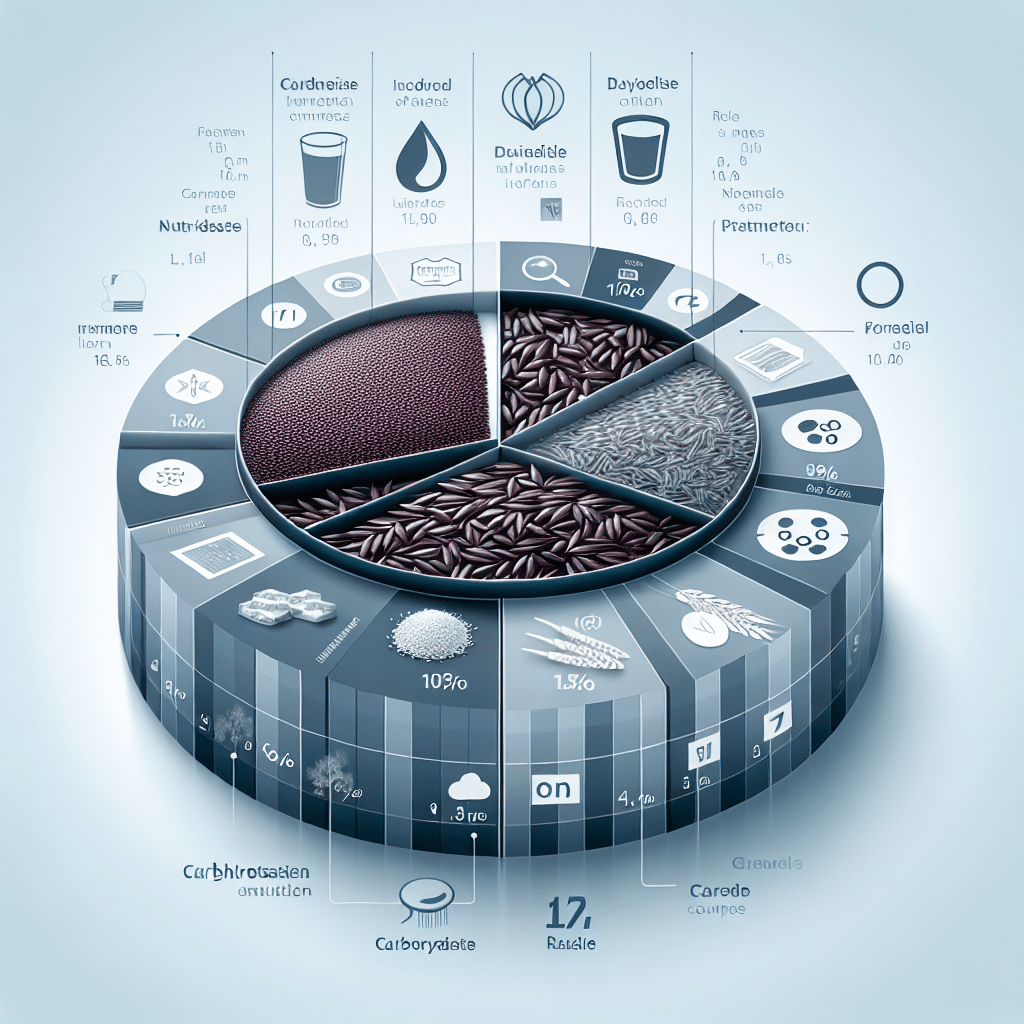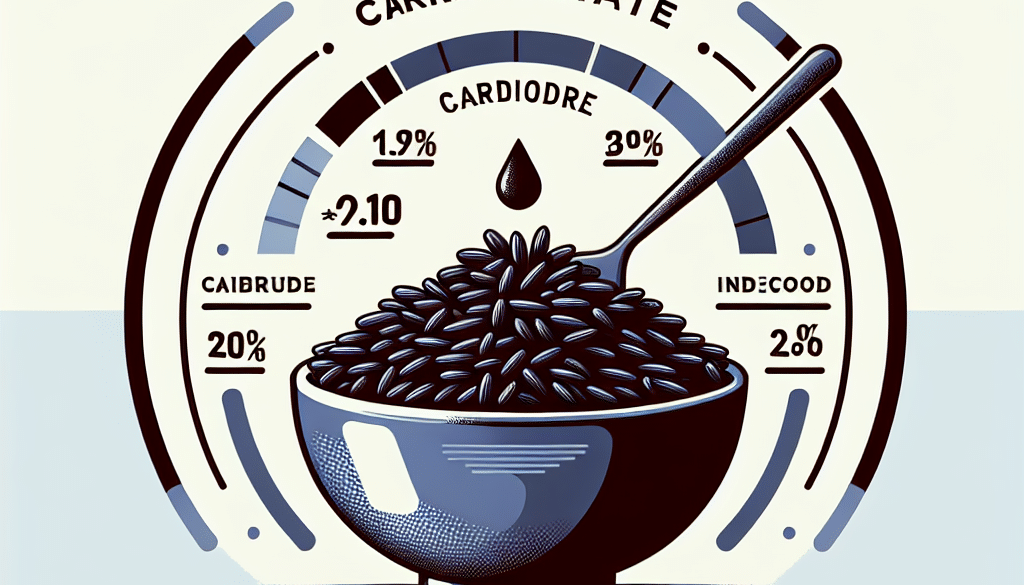Is black rice high in carbs?
-
Table of Contents
- Black Rice: A Comprehensive Look at Its Carbohydrate Content
- Understanding Carbohydrates in Black Rice
- Nutritional Breakdown of Black Rice
- Comparing Black Rice to Other Varieties
- Health Benefits of Black Rice
- Incorporating Black Rice into Your Diet
- Recipe Ideas and Serving Suggestions
- Conclusion: Balancing Carbs and Nutrition with Black Rice
- ETprotein’s Protein Products: A Complementary Addition to Your Diet
Black Rice: A Comprehensive Look at Its Carbohydrate Content

Black rice, often referred to as ‘forbidden rice’ due to its historical consumption by royalty in ancient China, has gained popularity in modern diets for its nutritional benefits and unique flavor. As health-conscious individuals seek out healthier alternatives to white rice, questions about black rice’s carbohydrate content and its place in a balanced diet have become more prevalent. This article delves into the nutritional profile of black rice, focusing on its carbohydrate content, and provides insights into how it compares with other rice varieties and fits into various dietary patterns.
Understanding Carbohydrates in Black Rice
Carbohydrates are a primary source of energy for the body, and they are found in a wide range of foods, including grains like rice. Black rice is no exception; it contains carbohydrates that are essential for providing energy to the body. However, the type and amount of carbohydrates in black rice may differ from other rice varieties, which can influence its impact on health.
Nutritional Breakdown of Black Rice
Black rice is a whole grain, which means it contains all parts of the grain — the bran, germ, and endosperm. This is in contrast to white rice, which has had the bran and germ removed during processing. The presence of the bran and germ not only contributes to the darker color of black rice but also to its higher nutrient content, including fiber, vitamins, and minerals.
- Carbohydrate Content: A typical serving of cooked black rice, which is about 1/4 cup (45 grams) uncooked, contains approximately 34 grams of carbohydrates.
- Fiber Content: Black rice is a good source of dietary fiber, with a serving containing around 2 to 3 grams. This is significantly higher than white rice, which contains very little fiber.
- Caloric Content: A serving of black rice provides roughly 160 calories, with the majority of these calories coming from its carbohydrate content.
Comparing Black Rice to Other Varieties
When compared to white and brown rice, black rice stands out for its nutritional density. While all three types of rice have similar amounts of carbohydrates per serving, the quality of these carbohydrates differs. The fiber in black rice not only contributes to a lower glycemic index but also aids in digestion and provides a sense of fullness, which can be beneficial for weight management.
Health Benefits of Black Rice
Black rice is not only rich in carbohydrates but also boasts a variety of health benefits that make it a valuable addition to a balanced diet.
- Antioxidant Properties: Black rice is high in anthocyanins, the pigments that give it its distinctive color. These compounds have potent antioxidant properties that can help protect against oxidative stress and inflammation.
- Heart Health: The fiber and phytonutrients in black rice may contribute to heart health by reducing cholesterol levels and improving blood vessel function.
- Blood Sugar Management: The fiber content in black rice can help slow the absorption of sugar into the bloodstream, which may be beneficial for individuals with diabetes or those looking to maintain stable blood sugar levels.
Incorporating Black Rice into Your Diet
Given its carbohydrate content and nutritional benefits, black rice can be a healthy part of many diets. It can be used as a substitute for white or brown rice in a variety of dishes, from stir-fries to salads to desserts. For those on low-carb or ketogenic diets, black rice may need to be consumed in moderation due to its carbohydrate content. However, its high fiber and nutrient density can make it a worthwhile inclusion when balanced with other low-carb foods.
Recipe Ideas and Serving Suggestions
Black rice can be a versatile ingredient in the kitchen. Here are some ideas for incorporating it into meals:
- As a base for grain bowls topped with vegetables, lean protein, and a flavorful sauce.
- Mixed with herbs and vegetables as a colorful and nutritious side dish.
- Incorporated into sushi rolls for a visually striking and healthier alternative to white sushi rice.
- Used in puddings and desserts, taking advantage of its natural nutty flavor and chewy texture.
Conclusion: Balancing Carbs and Nutrition with Black Rice
Black rice is indeed high in carbohydrates, but it is also rich in dietary fiber, antioxidants, and other nutrients that contribute to its health benefits. When consumed as part of a balanced diet, black rice can support overall health and may offer advantages over more refined grains. Its unique flavor and texture also make it an appealing choice for those looking to diversify their grain intake.
ETprotein’s Protein Products: A Complementary Addition to Your Diet
For individuals looking to balance their carbohydrate intake with high-quality protein sources, ETprotein offers a range of organic and vegan protein products that can complement a diet that includes black rice. Their organic rice protein, for example, can be an excellent addition to smoothies, baked goods, or protein bars, providing the essential amino acids necessary for muscle repair and growth. By incorporating ETprotein’s products into your diet, you can create well-rounded meals that support your health and fitness goals.
About ETprotein:
ETprotein, a reputable protein and L-(+)-Ergothioneine (EGT) Chinese factory manufacturer and supplier, is renowned for producing, stocking, exporting, and delivering the highest quality organic bulk vegan proteins and L-(+)-Ergothioneine. They include Organic rice protein, clear rice protein, pea protein, clear pea protein, watermelon seed protein, pumpkin seed protein, sunflower seed protein, mung bean protein, peanut protein, and L-(+)-Ergothioneine EGT Pharmaceutical grade, L-(+)-Ergothioneine EGT food grade, L-(+)-Ergothioneine EGT cosmetic grade, L-(+)-Ergothioneine EGT reference grade and L-(+)-Ergothioneine EGT standard. Their offerings, characterized by a neutral taste, non-GMO, allergen-free attributes, with L-(+)-Ergothioneine purity over 98%, 99%, cater to a diverse range of industries. They serve nutraceutical, pharmaceutical, cosmeceutical, veterinary, as well as food and beverage finished product distributors, traders, and manufacturers across Europe, USA, Canada, Australia, Thailand, Japan, Korea, Brazil, and Chile, among others.
ETprotein specialization includes exporting and delivering tailor-made protein powder and finished nutritional supplements. Their extensive product range covers sectors like Food and Beverage, Sports Nutrition, Weight Management, Dietary Supplements, Health and Wellness Products, and Infant Formula, ensuring comprehensive solutions to meet all your protein needs.
As a trusted company by leading global food and beverage brands and Fortune 500 companies, ETprotein reinforces China’s reputation in the global arena. For more information or to sample their products, please contact them and email sales(at)ETprotein.com today.












